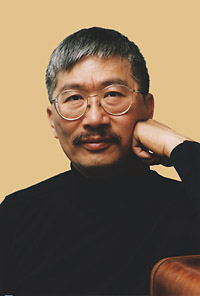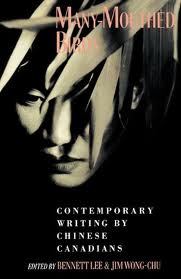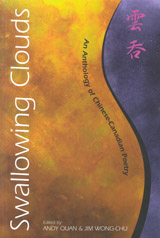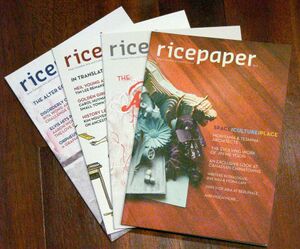Jim Wong Chu: Difference between revisions
No edit summary |
No edit summary |
||
| Line 1: | Line 1: | ||
{{AAType | {{AAType | ||
|Image= | |Image=RP15.4_FeatureInterviewJWC_JUechi_photocredit_theMan.jpg | ||
|Home page=http://www.asiancanadianwriters.ca/ | |Home page=http://www.asiancanadianwriters.ca/ | ||
|Location=Vancouver | |Location=Vancouver | ||
| Line 31: | Line 31: | ||
In 1996, Jim Wong-Chu along with Mishtu Banerjee, Mo-Ling Chui, Grace Eiko Thomson, and Winston Xin formed the Vancouver Asian Heritage Month Society, as an organization that endeavoured to explore the diversity of Asian Canadian life and culture and promote the discussion of relevant issues and concerns within and beyond the Asian Canadian community. | In 1996, Jim Wong-Chu along with Mishtu Banerjee, Mo-Ling Chui, Grace Eiko Thomson, and Winston Xin formed the Vancouver Asian Heritage Month Society, as an organization that endeavoured to explore the diversity of Asian Canadian life and culture and promote the discussion of relevant issues and concerns within and beyond the Asian Canadian community. | ||
{{#widget:YouTube|width= | {{#widget:YouTube|width=220|id=j-eOoj4hqvM|ACWW: Jim Wong-Chu at literASIAN launch}} | ||
Revision as of 04:41, 1 April 2014
Vancouver 49° 15' 39.14" N, 123° 6' 50.23" W Arts Literature Poetry Person
Jim Wong-Chu is a poet, author, editor, and historian known as a co-founder of the Asian Canadian Writers Workshop, Ricepaper Magazine, anthologies of Asian Canadian writers and the Vancouver Asian Heritage Month Festival.
Early Life
Born in Hong Kong in 1949, but raised in Canada as a paper son, Jim Wong-Chu is well known as a pioneer of the Asian Canadian activist movement. He is among the first authors of Asian descent with the likes of SKY Lee and Paul Yee who challenged the Canadian literary establishment and questioned why it was devoid of any Asian writers. Without role models or any blueprint, the trio began to experiment with different forms of fiction and decided to not only get published but also form informal writing networks to encourage other Asian Canadians to hone their craft.
Asian Canadian Literature
An idea for an Asian Canadian literary anthology thus germinated in the 1960s, when Jim Wong-Chu and a group of young Asian Canadians began to explore their identities. That exploration took them back to their roots and ignited a desire to express who they were as Canadians of Asian descent. Jim Wong-Chu is a poet whose book Chinatown Ghosts (Arsenal Pulp Press, 1986; now out of print) was the first poetry book by an Asian Canadian writer.
In the mid-‘60s and mid-‘70s, a lot of Asian Canadian writers were looking to get published. In the 1970s, Canada Council was supplying a lot of money to independent publishers, and there was a lack of voice coming from the Asian Canadian communities. Inalieable Rice: A Chinese and Japanese Anthology (1979) was the most groundbreaking as the first ever Asian Canadian anthology.
Before Asian Canadian writing was considered a genre unto itself, one of Wong-Chu’s most critical projects took place in the library stacks of the University of British Columbia, where he went over the entire inventory of books with a fine-tooth comb, looking up literary magazines dating back 10 to 20 years. His mission in 1989 was to map all Asian Canadian writers and their material, finally compiling them into an anthology of Asian Canadian literature. Taking the twenty best works, Wong-Chu and co-editor Bennett Lee published an anthology called Many Mouthed Birds. The publishing of this anthology created the phenomenon of Asian Canadian writing that exists today. One of the short stories included Wayson Choy's piece, who later turned expanded into the Vancouver Book award-winning Jade Peony. In addition to co-editing Many Mouthed Birds, Wong-Chu also co-edited with Andy Quan Swallowing Clouds, published by Arsenal Pulp Press in 1999..Asian Canadian Writer's Workshop
In 1996, Jim Wong-Chu became one of the founders of the Asian Canadian Writers’ Workshop (ACWW) and moved from the basements to a formal registered not-for-profit society. Until the early ‘90s, there was not much of a critical mass of Asian Canadian writers. The university English departments were producing a lot of young people who wanted to write, so within a couple of years, about 20 members of the Asian Canadian Writers’ Workshop suddenly went up to 70 members.
Wong-Chu started off simply, by offering workshops and then later turning its to manuscript preparation by helping young writers to find a publisher. Asian Canadian Writers’ Workshop became both an editor and agent for young emerging writers. In 1995, ACWW’s created an internal newsletter named Ricepaper Magazine. Wong-Chu was interested in creating a body of literature to legitimize and create an Asian Canadian genre that could be put into a library. Ricepaper continues strong in its eighteen years as a quarterly publication featuring new and existing Asian Canadian writers.In 1996, Jim Wong-Chu along with Mishtu Banerjee, Mo-Ling Chui, Grace Eiko Thomson, and Winston Xin formed the Vancouver Asian Heritage Month Society, as an organization that endeavoured to explore the diversity of Asian Canadian life and culture and promote the discussion of relevant issues and concerns within and beyond the Asian Canadian community.
{{#widget:YouTube|width=220|id=j-eOoj4hqvM|ACWW: Jim Wong-Chu at literASIAN launch}}



